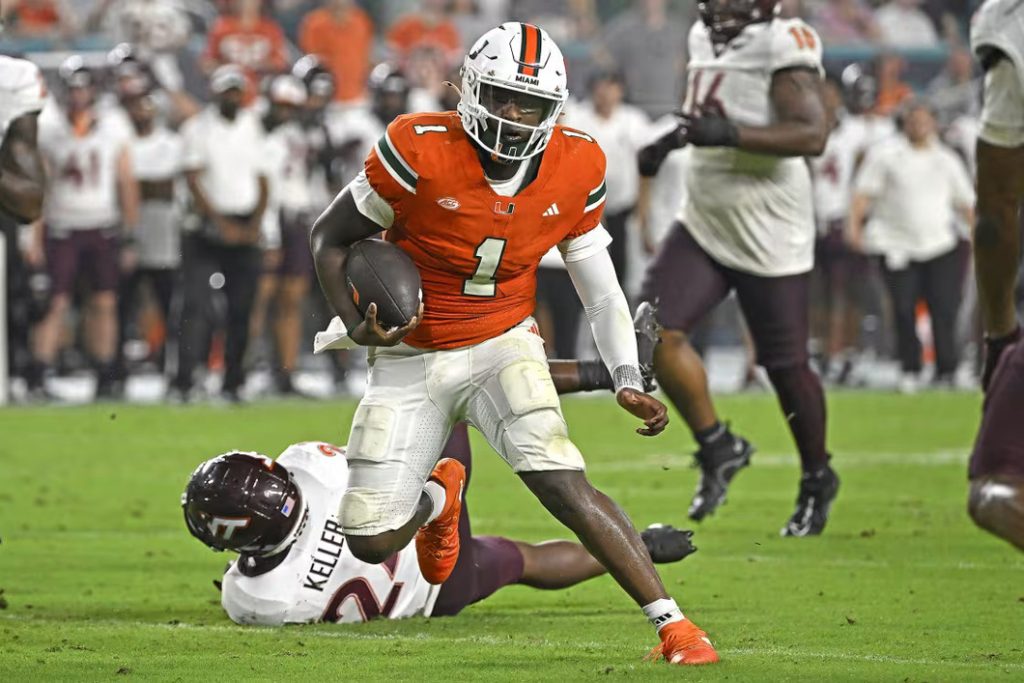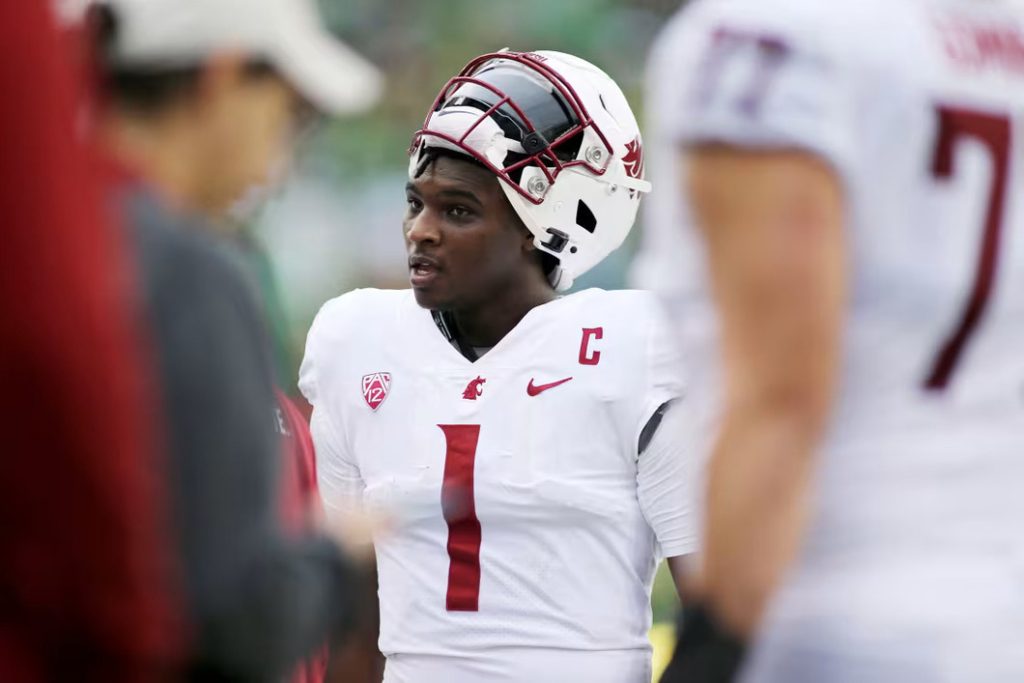To Steve Van Meter, it was immediately clear that the high school sophomore possessed every trait a college coach could want in a quarterback.
Cam Ward excelled in the classroom, ranking near the top of his class, and stood out on the basketball court as his high school’s leading scorer. On the football field, he was a naturally accurate passer. When Van Meter—a retired coach with decades of experience training quarterbacks in the Houston area—asked Ward to adjust his throwing mechanics, he would absorb the instruction and apply it by the very next throw.
Then there was his arm. The first time Van Meter saw Ward throw, the ball spun so fast it cut through the air with a whistle.
“I was a Texas high school head coach for 28 years and coached for 38,” Van Meter said. “I’ve had Division I quarterbacks—but I’ve never seen a ball come out of anyone’s hands like that.”
Still, when Van Meter raved about Ward’s talent to his network of college coaches, he was met with skepticism. Ward played in a small town, in a system that rarely passed the ball—an offense so unconventional it made recruiters wary. Despite his obvious potential, Ward entered the summer of 2019—just before his senior year—without a single college scholarship offer.
“There came a point where I started questioning myself,” Van Meter said. “I was thinking, ‘Do I even know what I’m talking about? Why isn’t anyone else seeing this?’ I knew no one throws the ball like this kid does.”
Fast forward nearly six years, and Ward, now 22, is expected to take the stage at the NFL Draft on Thursday as the No. 1 overall pick—potentially making him one of the most unlikely top selections in the league’s modern history. His journey to this point isn’t just about coming from a smaller college—it’s that he barely had the chance to play college football at all. For many around Ward, the biggest question was never about his talent, but whether any college program would take the risk to recognize it.
“I’ve had countless coaches tell me how much they loved him, but they just couldn’t take the chance,” said Eric Morris, who gave Ward his first and only college scholarship while serving as head coach at the University of the Incarnate Word, a private Catholic school in Texas. “I’m like, ‘Yeah, yeah, yeah—whatever. Of course, you love him now that he’s had all that success.’”

From Baker Mayfield, who turned down Division I offers to walk on at Texas Tech before rising to stardom at Oklahoma, to offensive lineman Eric Fisher, who was relatively unknown when he signed with Division I Central Michigan, overlooked recruits have gone on to be selected No. 1 in the NFL draft. Quarterbacks like Josh Allen (Wyoming) and Aaron Rodgers (California) also made the leap from lightly recruited high school players to NFL MVPs.
However, these stories are the exception in a draft where recruiting rankings often correlate with future NFL success. Five-star recruits have a much higher likelihood of becoming first-round picks.
When Ward arrived at the University of the Incarnate Word’s campus in San Antonio for a football camp in the summer of 2019, he wasn’t entirely unknown among Texas college coaches. The previous year, Ward and his father had traveled to as many college camps as possible to make up for the exposure he lacked as a high school starter in West Columbia, a small town about an hour south of Houston. There, Ward’s team ran a “Wing T” offense that primarily focused on the run—an outdated system in a state where the spread offense reigns, with quarterbacks often throwing 50 times a game to multiple receivers.
Brent Mascheck, Ward’s high school coach, believed it was a “cop-out” for recruiters to use the Wing T offense as an excuse to overlook Ward’s talent instead of trusting their own instincts and projections.
From Austin to Dallas, Ward traveled the state, hoping that showcasing his arm—one that was rarely used in his high school highlights—could land him a scholarship. Despite the rise of social media and the intense media coverage surrounding high school football recruiting, Ward entered his senior season with zero scholarship offers. On the five-star recruiting scale, Ward had none.
Texas A&M, along with a few other schools, came close to offering, but ultimately, they did not, according to Van Meter. For both Mascheck and Van Meter, several college coaches expressed a concern that extended beyond Ward’s case—that it was too risky to vouch for an under-the-radar recruit over a four- or five-star player, even if they believed the lesser-rated prospect was a better fit.
“If you try to bring that kid to the head coach, you better know what you’re doing,” Van Meter said. “Because if you don’t, and that kid doesn’t pan out, guess what? You’re looking for a job.”
In 2019, with fewer than 6,000 undergraduates and competing in the NCAA’s second-highest division, Incarnate Word was a small player in the world of big-time college football, far from the realm of five-star recruits.
“It was a little easier to take a chance on a kid,” said Morris, now the head coach at North Texas. Success at that level relied on finding hidden talent. Ward’s performance at the school’s camp was “phenomenal,” Morris recalled. “As good as a camp workout as I’ve ever seen.” Morris, who had coached future NFL quarterbacks like Baker Mayfield, Patrick Mahomes, and Case Keenum in college, was impressed.
But even then, the coaches found themselves “second-guessing” their judgment, said Mack Leftwich, who was the offensive coordinator under Morris at the time. They couldn’t quite understand why they seemed to be the only ones seeing Ward’s potential.
“We’re all scratching our heads, kind of, ‘What are we missing here?’” Morris said. “As a college coach, you start looking for all the negatives. What are the negatives about this kid? And as we kept digging, there were no negatives.”
Leftwich added, “In that situation, you just have to trust your evaluation and trust your instincts on a kid.”
That summer, the staff remained intrigued by Ward’s talent. During a staff meeting, Morris called Van Meter and put him on speakerphone to ask for his take on the quarterback. The lack of other offers made the school hesitant to be the first to extend one.
“I said, ‘Well, Coach, don’t take offense to this, but if Cam was in my offense, or in any spread offense where he could throw the ball 25, 35, 40 times a game, you guys wouldn’t have a shot at him,’” Van Meter said. “Everyone on his staff started laughing. But [Morris] said, ‘Coach, that’s exactly what we’ve been talking about—we think we got a steal.’ I said, ‘Coach, I promise you, you got a steal.’”

Ward’s throwing mechanics needed refinement, and there were questions about how consistent a quarterback could be after attempting only 267 passes in three high school seasons, especially when asked to throw 40 or more times per game in college. Mascheck recalled one college coach criticizing Ward’s frame, which at the time was about 6-foot-1 and 240 pounds—about 20 pounds heavier than he weighed at the NFL Combine in February.
What ultimately sold Incarnate Word on Ward was partly his basketball tape. Raised around the game—his mother coached high school basketball—Ward played with his eyes up, anticipating open teammates and driving lanes, much like a quarterback does on the field. The coaching staff admired his competitive spirit and his drive to win, drawing inspiration from Kobe Bryant. Plus, Incarnate Word wasn’t asking him to be the savior of the program.
The school already had an All-American-caliber starter at quarterback, which, in Leftwich’s view, would give Ward at least two seasons to develop and learn the nuances of the spread offense with little pressure. When COVID canceled Incarnate Word’s fall 2020 season, Ward had even more time to refine his skills during practices.
That extra development time proved crucial. When Ward walked into Morris’s office on his first day as a freshman, he declared he would win the starting job not in two seasons, but that fall. Three months later, he had made “about one or two plays a day that made you think, ‘Oh my gosh, this kid has a chance to be special,’” Leftwich said.
“His confidence in what he does on a day-to-day basis, and his ability to stay calm and unshaken no matter who’s across from him, is one of his strongest qualities,” Morris said.
In one practice, Ward threw a pass around an oncoming blitzer, landing it perfectly in his receiver’s hands. Leftwich, now the offensive coordinator at Texas Tech, recalled that later that day, Incarnate Word coaches had rewatched the play at least 15 times.
Ward was an anomaly. His rise was aided by NCAA rule changes that no longer required transfers to sit out a season, giving players from smaller programs like Ward more upward mobility. After Morris left for Washington State, Ward transferred to the Cougars in 2022, and then to Miami in 2024, where he boosted his draft stock by performing well against tougher competition. Along the way, he earned praise for his poise under pressure and his outward confidence—qualities that were evident in high school, if anyone had been paying attention.
While at Incarnate Word, Ward and Leftwich had discussed the possibility of him playing in the NFL. In fact, before Ward even played a game for Incarnate Word, Leftwich was at Thanksgiving in 2020 with his family when he told his father and brother, another college coach, that tiny Incarnate Word had a future NFL quarterback on its roster.
This week, Ward will prove that prediction true. It may never have happened, however, without the willingness to offer him a chance when no one else would.
“Holy cow, we just coached a potential No. 1 overall pick at the University of Incarnate Word,” Leftwich said. “It’s pretty unbelievable, honestly.”



